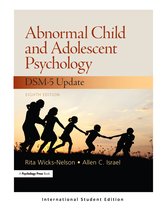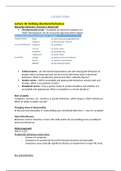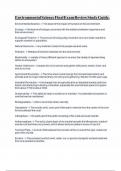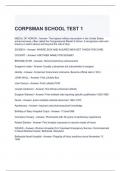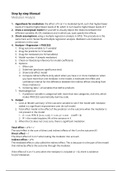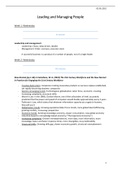Lecture notes
Lecture 1B: Defining disordered behaviour
Disruptive behaviour: Normal or Abnormal?
Developmental norms = standards by which the progress of a
child's development can be measured (age-dependent stages)
Cultural norms = are the shared expectations and rules that guide behaviour of
people within social groups and can be used to determine what is abnormal
behaviour. What is accepted by parents and other authority figures?
Gender norms = define acceptable and appropriate behaviour among male and
females. What is accepted by society?
Situational norms = how a person reacts in certain situations and whether it is
acceptable and appropriate. What is accepted in a certain situation?
Role of adults:
Caregivers, teachers, etc. reinforce or punish behaviour, which shapes a child’s behaviour.
What do adults consider normal?
Changing views of abnormality:
In the past homosexuality or masturbating was considered abnormal -> now it is accepted
Harm/interference:
Behaviour need to interfere or harm the child and/or its surroundings to be considered
abnormal behaviour
Clinical approach
DSM V & ICD
Problematic behaviour exists when:
- Clusters of symptoms
- Symptoms are persistent/recurrent/intense/excessive/unreasonable
- Symptoms cause clinically significant distress or impairment in major life areas
Key characteristics:
, - Clinician-derived
- Categorical (either you have a disorder or you don’t)
- Commonly used
- Changing conceptualisation of disorders in young people
Criticism:
- Overdiagnosing
- Lacking clear evidence of validity
- Lacking clear decision rules
- Reifying disorders (putting a label on a disorder, whilst not being a real entity)
- De-emphasizing context
- De-emphasizing developmental differences
Empirical approach
CBCL
Key characteristics:
- Research/statistics-derived
- Syndromes (broadband -> ADHD and narrowband -> anxiety/depression)
- Dimensional (quantitative differences)
- Use data from normative samples
Lecture 1C: investigating causation
1. Systems framework
2. Risk and protective
3. Moderation and mediation
4. Direct and indirect influences
Dev/Psy is a systems framework
Biopsychosocial model:
Biological
- Genetic processes
- Pre-/peri-/post-natal CNS damage
- Temperament
Psychological
- Learning experience
- Cognitive processes
- Emotion regulation
- Executive functioning
Sociocultural
- Family context
- Peer context
- Communal and societal contexts
Risk and protective factors should be considered to understand development:
Risk factors (e.g. stress)
Protective factors (e.g. sufficient support system)
Resilience (= don’t develop psychopathology despite experiencing risk factors)
, Moderation & mediation
Strength of relationship between both variables depends on the moderating variable
Mediating variable explains the relationship between two variables and intervenes between
them
Direct & indirect influences
Distal/proximal factors
Distal = underlying vulnerability for a particular condition (predisposition)
Proximal = immediate vulnerability for a particular condition (abuse)
Developmental pathways are probabilistic rather than deterministic
Lecture 1B: Defining disordered behaviour
Disruptive behaviour: Normal or Abnormal?
Developmental norms = standards by which the progress of a
child's development can be measured (age-dependent stages)
Cultural norms = are the shared expectations and rules that guide behaviour of
people within social groups and can be used to determine what is abnormal
behaviour. What is accepted by parents and other authority figures?
Gender norms = define acceptable and appropriate behaviour among male and
females. What is accepted by society?
Situational norms = how a person reacts in certain situations and whether it is
acceptable and appropriate. What is accepted in a certain situation?
Role of adults:
Caregivers, teachers, etc. reinforce or punish behaviour, which shapes a child’s behaviour.
What do adults consider normal?
Changing views of abnormality:
In the past homosexuality or masturbating was considered abnormal -> now it is accepted
Harm/interference:
Behaviour need to interfere or harm the child and/or its surroundings to be considered
abnormal behaviour
Clinical approach
DSM V & ICD
Problematic behaviour exists when:
- Clusters of symptoms
- Symptoms are persistent/recurrent/intense/excessive/unreasonable
- Symptoms cause clinically significant distress or impairment in major life areas
Key characteristics:
, - Clinician-derived
- Categorical (either you have a disorder or you don’t)
- Commonly used
- Changing conceptualisation of disorders in young people
Criticism:
- Overdiagnosing
- Lacking clear evidence of validity
- Lacking clear decision rules
- Reifying disorders (putting a label on a disorder, whilst not being a real entity)
- De-emphasizing context
- De-emphasizing developmental differences
Empirical approach
CBCL
Key characteristics:
- Research/statistics-derived
- Syndromes (broadband -> ADHD and narrowband -> anxiety/depression)
- Dimensional (quantitative differences)
- Use data from normative samples
Lecture 1C: investigating causation
1. Systems framework
2. Risk and protective
3. Moderation and mediation
4. Direct and indirect influences
Dev/Psy is a systems framework
Biopsychosocial model:
Biological
- Genetic processes
- Pre-/peri-/post-natal CNS damage
- Temperament
Psychological
- Learning experience
- Cognitive processes
- Emotion regulation
- Executive functioning
Sociocultural
- Family context
- Peer context
- Communal and societal contexts
Risk and protective factors should be considered to understand development:
Risk factors (e.g. stress)
Protective factors (e.g. sufficient support system)
Resilience (= don’t develop psychopathology despite experiencing risk factors)
, Moderation & mediation
Strength of relationship between both variables depends on the moderating variable
Mediating variable explains the relationship between two variables and intervenes between
them
Direct & indirect influences
Distal/proximal factors
Distal = underlying vulnerability for a particular condition (predisposition)
Proximal = immediate vulnerability for a particular condition (abuse)
Developmental pathways are probabilistic rather than deterministic


